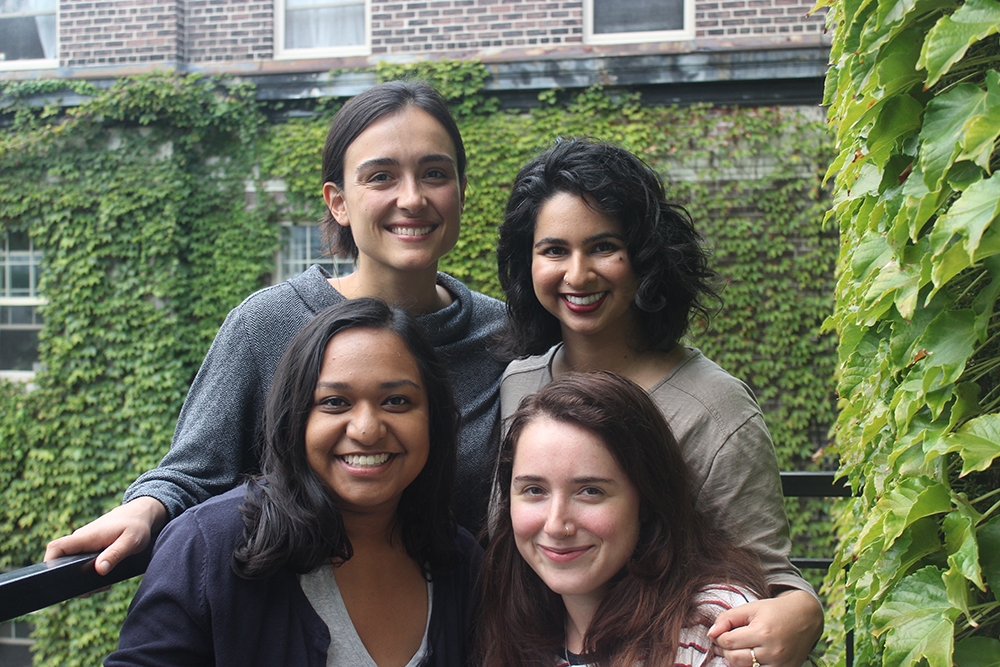Bernice Afriyie | Arts Editor
Featured image: Pictured above, GUTS editors Carmina Ravanera, Nadine Adelaar, Cynthia Spring and Maneet Dhaliwal will host their event “GUTS does the internet.” | Courtesy of GUTS
University is a space to learn, meet new people and challenge problematic systems of power in society. However, outside university walls, many students don their grad caps and trade in their challenged minds for nine-to-five or part-time jobs. Education isn’t free, and in turn, many new graduates cannot afford to be free thinkers.
Cynthia Spring and Nadine Adelaar, co-founders of GUTS magazine, are examples of students who have walked the worn road of post-graduate uncertainty. After completing their master’s degrees in English at the University of Alberta, Spring and Adelaar started discussing what would be known today as GUTS. As they applied to work after completing their degrees, Spring and Adelaar also wanted to keep in touch with the radical thinkers they had met in school and extend those connections into their communities.
“Well aware of the lack of representational access to mainstream media as a result of various marginalizations, we set out to create an online magazine,” says Spring.
GUTS is dedicated to highlighting the work of people from a variety of genders, with a concentration on the work of women—trans and cis—and non-binary people, as described by Spring.
“We live under patriarchy and one of patriarchy’s strategies is to devalue people and behaviour deemed feminine.”
As I set out to create interview questions, I failed to question my understanding of womanhood and femininity. My questions were at times complicit with essentialist approaches to what it means to be a cis woman. I’ve read feminists, trans and queer theory and believe in intersectional approaches to identity as a black woman, but in that instance my complicitness in constructing patriarchy was undeniable. By accidentally forgetting to mention the works of trans and queer women, I was perpetuating that same power relation.
By amplifying the unheard voices in our communities, GUTS allows readers to learn and grow. More importantly, it allows people to tell their stories on their own terms. “People with power are so averse to digging into the systems of oppression we live under,” explains Spring. “GUTS is about doing the messy work of untangling, and keeping each other company while we do this labour, with solidarity you can feel in your belly.”
Despite the essential work that Adelaar and Spring are doing in this heightened time of media and cultural attention to queer and trans stories, as an online magazine run by volunteers, they struggle with transferring feminist theory approaches into paid and unpaid labour.
“We do this hard work for free because it’s what we love to do, and we believe it is important,” says Spring. “At the same time, we are very critical of the tendency to not pay people, especially feminized people, a fair wage for creative work. The fact that our magazine is run by volunteers is not only consistent with this tendency, it also excludes those who cannot afford to work for free. A volunteer-based editorial board is a gatekeeping mechanism, which is why one of our most pressing goals at this point is to develop a funding model that allows us to pay our editors.”
To combat this, GUTS has held fundraising events in the past and is holding one this Friday September 30 at 360 Geary Lane titled “GUTS Does the Internet.” The event will be host to a zine and art fair featuring feminist DJs, hair braiding and previous contributing artists, with all proceeds going towards paying contributors. Doors open at 9 p.m. Entrance to the event is $10 in advance and $15 at the door, and all are invited.


